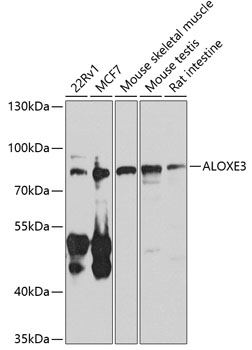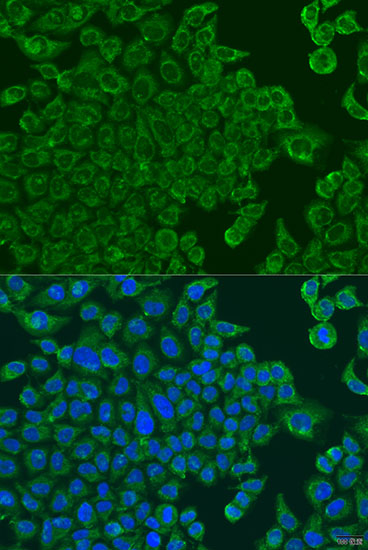-
Product Name
ALOXE3 Polyclonal Antibody
- Documents
-
Description
Polyclonal antibody to ALOXE3
-
Tested applications
WB, IF
-
Species reactivity
Human, Mouse, Rat
-
Alternative names
ALOXE3 antibody; ARCI3 antibody; E-LOX antibody; eLOX-3 antibody; eLOX3 antibody; arachidonate lipoxygenase 3 antibody
-
Isotype
Rabbit IgG
-
Preparation
Antigen: Recombinant fusion protein containing a sequence corresponding to amino acids 1-280 of human ALOXE3 (NP_067641.2).
-
Clonality
Polyclonal
-
Formulation
PBS with 0.02% sodium azide, 50% glycerol, pH7.3.
-
Storage instructions
Store at -20℃. Avoid freeze / thaw cycles.
-
Applications
WB 1:500 - 1:2000
IF 1:50 - 1:200 -
Validations

Western blot - ALOXE3 Polyclonal Antibody
Western blot analysis of extracts of various cell lines, using ALOXE3 antibody at 1:1000 dilution.Secondary antibody: HRP Goat Anti-Rabbit IgG (H+L) at 1:10000 dilution.Lysates/proteins: 25ug per lane.Blocking buffer: 3% nonfat dry milk in TBST.Detection: ECL Basic Kit .Exposure time: 60s.

Immunofluorescence - ALOXE3 Polyclonal Antibody
Immunofluorescence analysis of U2OS cells using ALOXE3 antibody at dilution of 1:100. Blue: DAPI for nuclear staining.
-
Background
Non-heme iron-containing lipoxygenase which is atypical in that it displays a prominent hydroperoxide isomerase activity and a reduced dioxygenase activity compared to other lipoxygenases. The hydroperoxide isomerase activity catalyzes the isomerization of hydroperoxides, derived from arachidonic and linoleic acid by ALOX12B, into hepoxilin-type epoxyalcohols. The dioxygenase activity requires a step of activation of the enzyme by molecular oxygen. In presence of oxygen, oxygenates polyunsaturated fatty acids, including arachidonic acid, to produce fatty acid hydroperoxides. In the skin, acts downstream of ALOX12B on the linoleate moiety of esterified omega-hydroxyacyl-sphingosine (EOS) ceramides to produce an epoxy-ketone derivative, a crucial step in the conjugation of omega-hydroxyceramide to membrane proteins. Therefore plays a crucial role in the synthesis of corneocytes lipid envelope and the establishment of the skin barrier to water loss. In parallel, it may have a signaling function in barrier formation through the production of hepoxilins metabolites. Plays also a role in adipocyte differentiation through hepoxilin A3 and hepoxilin B3 production which in turn activate PPARG. Through the production of hepoxilins in the spinal cord, it may regulate inflammatory tactile allodynia.
Related Products / Services
Please note: All products are "FOR RESEARCH USE ONLY AND ARE NOT INTENDED FOR DIAGNOSTIC OR THERAPEUTIC USE"
